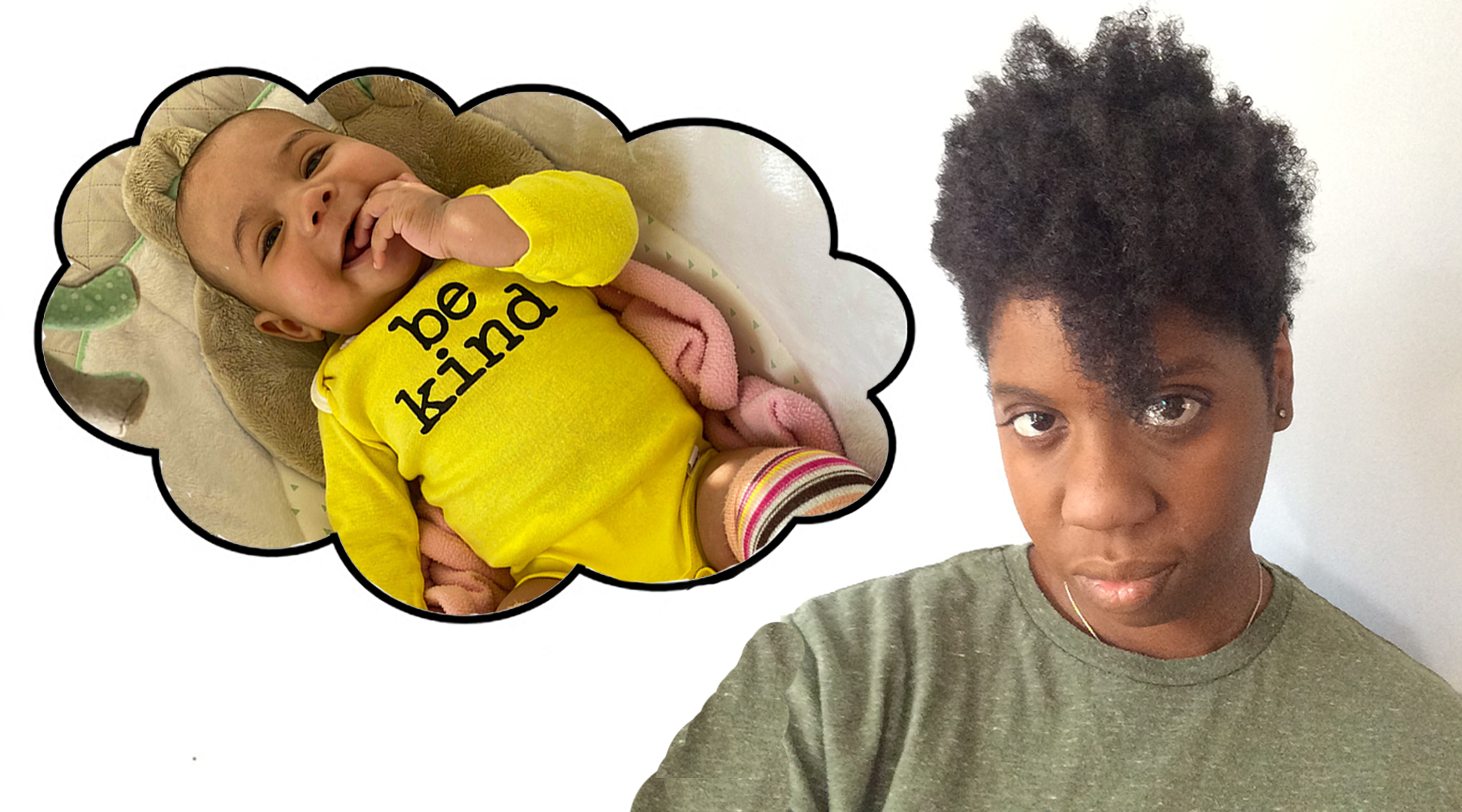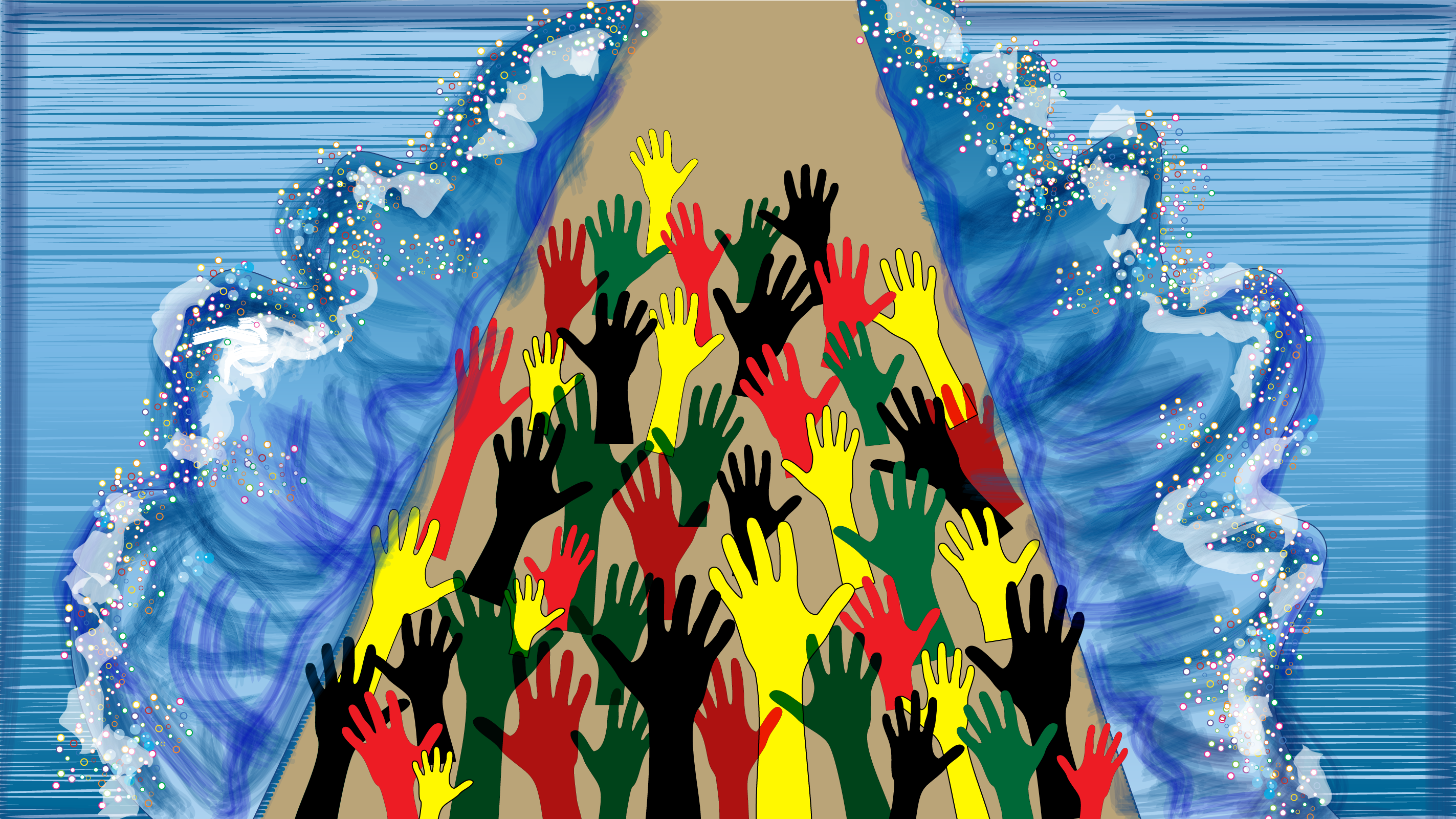 On Friday June 17th, 2022, Be’chol Lashon marked Juneteenth and welcomed Shabbat. In conjunction with Marlene Meyerson Jewish Community Center Manhattan, Keshet, and the JCRC of New York, we came together on a rooftop in Manhattan. Rabbi Isaama Goldstein-Stoll led the program which highlighted music on electric violin by Tova Harris and included the participation of Yanira Quinones and others.
On Friday June 17th, 2022, Be’chol Lashon marked Juneteenth and welcomed Shabbat. In conjunction with Marlene Meyerson Jewish Community Center Manhattan, Keshet, and the JCRC of New York, we came together on a rooftop in Manhattan. Rabbi Isaama Goldstein-Stoll led the program which highlighted music on electric violin by Tova Harris and included the participation of Yanira Quinones and others.
What follows is an adaptation of Rabbi Goldstein Stoll’s words to the gathering alongside some observations on the discussion that evolved.
“One of the major anxieties I have as a Jew of Color, as a Black rabbi, leading a Juneteenth program is that the event will feel like a minstrel show. I do not want to stand in front of my predominantly white Jewish community offering an exaggerated portrayal of blackness. I do not want the identities I hold to be entertainment for those who hear unfamiliar words like Juneteenth and excitedly gather for a curious spectacle.
I want to begin by naming my experiences. I want to request that those gather not watch me celebrate as a holiday that belongs to me but that we all fully engage and join with me in shared celebration; that we make the most of an opportunity to engage with something that may be a bit out of our comfort zones for the sake of honoring and celebrating something that is squarely aligned with our collective core values.
Juneteenth commemorates the effective end of chattel slavery in this country. On June 19th, 1865, troops roed into Galveston, Texas, and announced the emancipation of slaves to the final active stronghold of slavery in the United States. Every year since freed slaves and their descendants have celebrated this day as an anniversary of their long-awaited freedom.
Our Juneteenth celebration aimed to address two questions:
- What does Juneteenth mean?
- Why should Jews care about Juneteenth and what should we do to celebrate?
Juneteenth means embracing and understanding freedom. It is a celebration of all the joy, hope, and affirmation wrapped up in what it means to be free. The holiday also reinvigorates the resilience and tenacity needed to hold on to that freedom. Juneteenth helps us see that freedom is holy, transcendent, something that nobody will ever fully be able to take away.
 In time we moved to the pinnacle of our program, addressing what Juneteenth has to do with us as Jews? My personal answer is that Juneteenth offers a powerful and much-needed platform for Jews to engage in conversations about race. In my experience, some Jews are unaware or ambivalent about race and racism in Jewish spaces, but many have a desire to talk about race and do not know how to start or what to say.
In time we moved to the pinnacle of our program, addressing what Juneteenth has to do with us as Jews? My personal answer is that Juneteenth offers a powerful and much-needed platform for Jews to engage in conversations about race. In my experience, some Jews are unaware or ambivalent about race and racism in Jewish spaces, but many have a desire to talk about race and do not know how to start or what to say.
For some of us, the conversation starts here. We are confused about how we fit into the history, scared of looking stupid and saying the wrong thing, cautious about exposing our kids to the pain and violence that often manifests in our society along racial lines.
 Confusing and overwhelming- absolutely. But, talking about race does not have to be such a large monster that we feel we need to run and hide. We can begin doing the work by having honest conversations, by stopping and listening with an open mind to other people’s stories and experiences (when they offer to share) even when we want them not to be true and want to question or debunk them. Listening, Reflecting, Conversing – simple- that’s where it starts.
Confusing and overwhelming- absolutely. But, talking about race does not have to be such a large monster that we feel we need to run and hide. We can begin doing the work by having honest conversations, by stopping and listening with an open mind to other people’s stories and experiences (when they offer to share) even when we want them not to be true and want to question or debunk them. Listening, Reflecting, Conversing – simple- that’s where it starts.
I want to open our conversation by sharing a few stories of my own that illustrated some of the things about race in Jewish spaces that have been on my mind lately.
I have shown up at events before where I am the rabbi speaking or officiating the ceremony, only to be chased down the hall by a concerned congregant or security guard “excuse me miss, miss, this is a private event, it is only for Jews. I am going to have to ask you to leave.” “
 After this Rabbi Goldstein Stoll created an opportunity for community sharing. The discussion was in her words, “lively and uncomfortable.” Reflecting on what was experienced, that discomfort as she explains was positive.
After this Rabbi Goldstein Stoll created an opportunity for community sharing. The discussion was in her words, “lively and uncomfortable.” Reflecting on what was experienced, that discomfort as she explains was positive.
“being uncomfortable was a good thing, in fact, it was our goal. As we listened we aimed to tolerate and hold the ideas and emotions of others whose perspectives differ from ours. This, I believe, was a recipe for the sake of shared growth. This was a way to make full use of the platform Juneteenth offers.
Together we discussed whether Jews of color have a responsibility to educate white community members when they experience discrimination or alienation. We explored what it is like to realize later in life that not everyone shares your privileges and that discrimination and inequality are rampant and alive in our society. Some shared about what race in American Judaism feels like as an Ethiopian Jew and the desire for more creative ways to tell diverse Jewish stories. The stories and opinions shared offered a rich picture of the group’s diversity and pushed those present to think critically about Judaism and race through a new lens.”







